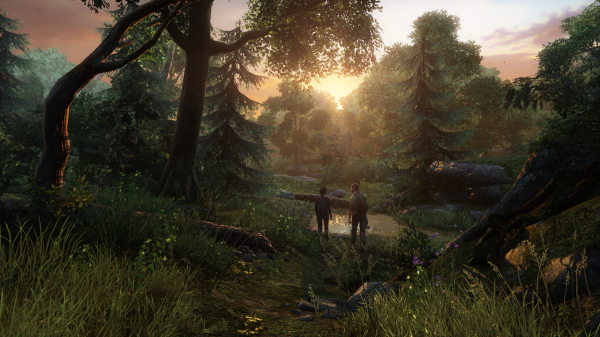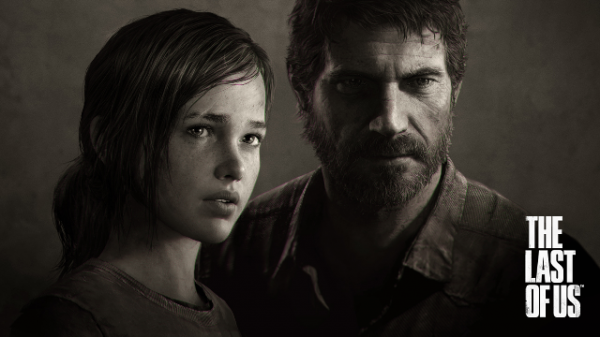
Premise: A man is charged with escorting a young girl to mysterious benefactors to unburden his own guilt, and finds himself developing a relationship that will change his entire life.
Pretend you didn’t read the headline, and try telling me what game I’m actually describing. There’s a couple dozen different correct answers here, and the chances of Troy Baker voicing the main character are growing. The manfather-escorts-girldaughter dynamic isn’t quite a dead horse of a trope, because some quality tales have been told relatively recently using that very setup, but make no mistake, the horse is bleeding, and no one’s easing up. One good look at the box art, with Joel and Ellie tromping through flooded streets, you can chart out how this game’s trajectory is going to play out, and for the most part, the first impression is correct. But how I feel about The Last of Us as it concerns that trope, and how it ultimately bears down on one of the most morally dirty endings in all video games depends on one question: How much do I trust Naughty Dog?
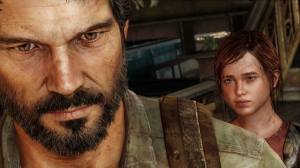 More specifically, do I trust that a game company would allow the continued playthrough of a game where the entirety of the final stage is the player murdering the few good people left in the world in the name of this one girl if they were not aware of its ramifications?
More specifically, do I trust that a game company would allow the continued playthrough of a game where the entirety of the final stage is the player murdering the few good people left in the world in the name of this one girl if they were not aware of its ramifications?
The game follows the trope rulebook to the letter on paper, with Joel refusing the call of daughterly love due to losing his biological daughter Sarah–in a playable sequence the game never tops, I might add–and cold shouldering everyone else. The game could’ve gone the easy route with much of this, but Joel is played with a rather incredible amount of restraint, considering the medium. The sadness, the regrets, are in the voice and performance, unsaid until the game’s twilight moments. The rest is simple implication. Joel and Tess at the beginning of the game obviously have chemistry, history together, but a relationship is not what either person wants. Bill had his relationship with his dead partner, but even as the scene plays out, it’s never made nail on the head clear until Ellie finds his gay porn (a scene that works as levity, but undercuts how progressive having a grizzled ornery badass turn out to be gay in a video game could’ve been). We’re never told the circumstances of Ellie’s life before, except in snippets. Joel never asks, because Joel doesn’t care, and Joel knows it kinda doesn’t matter.
These are the things that make me believe that they might be aware of their actions.
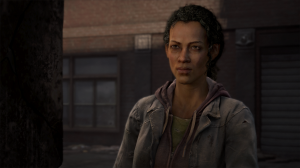 Once Ellie is in the picture, things progress as expected, and yet, even more than the other daughter-in-distress of this year, Elizabeth, Ellie feels like a real, modern girl, only barely comprehending her place in the world, how much power she has on her surroundings. When she begins her pleading for Bill and Joel to hand her a gun, from the player side, we are begging for the extra help. From the side of a viewer, we wait for the moment for Joel to trust her. Joel’s discomfort is frustrating, yet understood, and that goes further than even his issues with giving Ellie a proper weapon. The pacing is right. Joel and Ellie’s burgeoning chemistry is earned.
Once Ellie is in the picture, things progress as expected, and yet, even more than the other daughter-in-distress of this year, Elizabeth, Ellie feels like a real, modern girl, only barely comprehending her place in the world, how much power she has on her surroundings. When she begins her pleading for Bill and Joel to hand her a gun, from the player side, we are begging for the extra help. From the side of a viewer, we wait for the moment for Joel to trust her. Joel’s discomfort is frustrating, yet understood, and that goes further than even his issues with giving Ellie a proper weapon. The pacing is right. Joel and Ellie’s burgeoning chemistry is earned.
This makes me believe that they might be aware of their actions.
Eventually, Ellie and Joel’s bond is made solid after he takes her to his brother Tommy, and instead of dumping her on him, Joel makes room on his horse. Next time we see them, they have been talking about the world that was halfway down the country. It’s this segment that makes me forgive the trope entirely. The heart of The Last of Us, as I mentioned in the other review, is made bolder by the expertly crafted bond between these two. It’s not forced, or contrived. I believe these two characters would grow to care for each other, work as a team. And the game doesn’t make a mistake–THE mistake–of overplaying their emotional hands with the connection with Joel’s other daughter.
It is not made, because they might be aware.
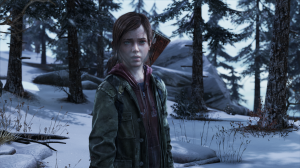 Winter comes, and Ellie is caretaker. We have the sequence that, in a bolder world, would support a game all by itself, with Ellie hunting food for a Joel near-death, having to handle herself in the face of sly, serpentine-voiced cannibals. She does so with bravado. She’s hardened, unafraid. There’s no fantasy in this girl being give weapons, forced to kill, and avoid being a weeping willow in captivity. The moment she breaks the leader’s finger and spits an insult is a classic, amazing feat of defiance, fast tempered by the cold-blooded kill she performs with a machete after. Something in Ellie dies and grows, and the game never comments. It leaves the harshest Winter in silence.
Winter comes, and Ellie is caretaker. We have the sequence that, in a bolder world, would support a game all by itself, with Ellie hunting food for a Joel near-death, having to handle herself in the face of sly, serpentine-voiced cannibals. She does so with bravado. She’s hardened, unafraid. There’s no fantasy in this girl being give weapons, forced to kill, and avoid being a weeping willow in captivity. The moment she breaks the leader’s finger and spits an insult is a classic, amazing feat of defiance, fast tempered by the cold-blooded kill she performs with a machete after. Something in Ellie dies and grows, and the game never comments. It leaves the harshest Winter in silence.
When Spring comes, the game promises new life. The sight of giraffes parading around a clear, green morning, Jurassic Park style, the echoing bookend of a view being everything they hoped for. The future seems possible, and the one moment where the game’s interactivity and its story converge is in the simple choice to enjoy the view as long as the player allows. The father and ersatz daughter get their moment as father and daughter. Maybe it’s even intentional that he, essentially, took her to the zoo. And then, a few minutes of gameplay later, Marlene arrives.
Knowing what we know about how this story has been executed, with subtlety, and gentleness, even in the face of crudeness, brutality, and all the horror, do I trust Naughty Dog with how the rest of the game plays out? Do I trust the best case scenario, which is that by allowing Joel to utterly condemn the true last of us by killing any and everyone standing in his way while his “daughter” lies sleeping, he is this trope’s horrible mutated form? Do I trust a sure hand behind this final act, of our protagonist stabbing a doctor in the neck, shooting the good-hearted woman sworn to protect Ellie at all costs, and the dozens of others trying only to protect their future? Do I trust that we, as audience, are supposed to100% hate the lie?
I’ve let that question roll around for a few days. I’m choosing yes, only because that leads to a new, more interesting, and distressing question of what we make of Naughty Dog having created one of the most reprehensible protagonists ever programmed into a game?
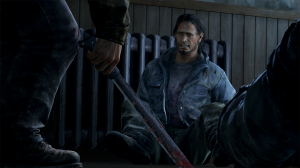 There’s a much longer, academic essay to be written about Joel embodying the ultimate, horrible culmination of the “my kid is special” whinging that permeates the American idea of parenting, which, in terms of every zombie story being a vehicle for other human fears, actually grants a few more brownie points in The Last of Us‘s favor, but I’m not the guy to write it. There’s another trope that’s been growing in the last few years worth talking about with the game, though nowhere near as ubiquitous as the whole father-daughter thing, primarily because being able to pull it off and not look like a fucking idiot takes a level of brilliance not everyone in the industry possesses, and that’s the trend of trying to indict the player in the questionable actions of the protagonist. Spec Ops, Silent Hill 2, Shadow of the Colossus are good examples. Braid is not. Bioshock tries. The Last of Us is in the middle. Because of the disconnect between the story and the gameplay, having to kill these soldiers to get to Ellie in that operating room is an unthinking necessity. We must kill, because killing is the only language the player can speak with the world. We cannot reason. Joel doesn’t even try reason. There’s only the guns, the shivs, the explosions. The one truth in Joel’s explanation at the game’s end is the fact that survival is all he knows how to do. In all the years of this father-daughter-escort trope being a thing, it is rare as diamonds for the player to have to earn his emotional keep with their young charge. The cutscenes do every ounce of the heavy lifting. Here, we have to. And it’s an atrocity. Because a father loves his “daughter” just that much.
There’s a much longer, academic essay to be written about Joel embodying the ultimate, horrible culmination of the “my kid is special” whinging that permeates the American idea of parenting, which, in terms of every zombie story being a vehicle for other human fears, actually grants a few more brownie points in The Last of Us‘s favor, but I’m not the guy to write it. There’s another trope that’s been growing in the last few years worth talking about with the game, though nowhere near as ubiquitous as the whole father-daughter thing, primarily because being able to pull it off and not look like a fucking idiot takes a level of brilliance not everyone in the industry possesses, and that’s the trend of trying to indict the player in the questionable actions of the protagonist. Spec Ops, Silent Hill 2, Shadow of the Colossus are good examples. Braid is not. Bioshock tries. The Last of Us is in the middle. Because of the disconnect between the story and the gameplay, having to kill these soldiers to get to Ellie in that operating room is an unthinking necessity. We must kill, because killing is the only language the player can speak with the world. We cannot reason. Joel doesn’t even try reason. There’s only the guns, the shivs, the explosions. The one truth in Joel’s explanation at the game’s end is the fact that survival is all he knows how to do. In all the years of this father-daughter-escort trope being a thing, it is rare as diamonds for the player to have to earn his emotional keep with their young charge. The cutscenes do every ounce of the heavy lifting. Here, we have to. And it’s an atrocity. Because a father loves his “daughter” just that much.
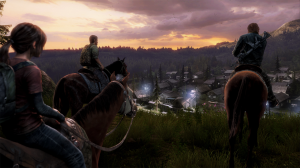 Now, the new question is do I think Naughty Dog’s smart enough to have made the disconnect between story and game intentional, where the fact that Joel is unable to conceive of a world where he is not scrapping for his life is a commentary in and of itself? That one’s a no. The game simply isn’t that meta. Instead, we are meant to believe that what Joel does for Ellie, he did to not lose another daughter. I wonder about posting an impartial poll from fathers who would make Joel’s decision, under the circumstances. Because if given a choice between sacrificing myself so that my flesh and blood might live, I accept. Given a choice between my flesh and blood and the entire world, and I choose my flesh and blood, we’re talking passive genocide. Ellie’s flat “Okay” at the end, I felt, was the full, unfiltered acceptance of that decision, and everything it entails, which is far more frightening than any of the infected the game has to offer. Ellie, and the player, get it. In The Last of Us, a father’s version of “I love you” is “I would let the whole fucking world die screaming if it means I don’t have to be alone.”
Now, the new question is do I think Naughty Dog’s smart enough to have made the disconnect between story and game intentional, where the fact that Joel is unable to conceive of a world where he is not scrapping for his life is a commentary in and of itself? That one’s a no. The game simply isn’t that meta. Instead, we are meant to believe that what Joel does for Ellie, he did to not lose another daughter. I wonder about posting an impartial poll from fathers who would make Joel’s decision, under the circumstances. Because if given a choice between sacrificing myself so that my flesh and blood might live, I accept. Given a choice between my flesh and blood and the entire world, and I choose my flesh and blood, we’re talking passive genocide. Ellie’s flat “Okay” at the end, I felt, was the full, unfiltered acceptance of that decision, and everything it entails, which is far more frightening than any of the infected the game has to offer. Ellie, and the player, get it. In The Last of Us, a father’s version of “I love you” is “I would let the whole fucking world die screaming if it means I don’t have to be alone.”
And that’s a fascinating place to leave a game, a medium that isn’t known for executing moral ambiguity on this scale ever, and it makes the ending of this game one for the ages. But it also makes The Last of Us a game I’d hesitate to revisit, knowing that this emotional connection built brick by brick over 12 hours, will lead to such grand scale human psycho/sociopathy. It’s almost the inverse of how I felt at the end of Bioshock Infinite. Sorry to go all Spoilerception here, but with Infinite Booker’s sin led to him selling his daughter, and allowing himself to die so that she can live, that Columbia may never happen. It’s a twist meant to play on and comment the consequences of our actions, in this game, and the whole Bioshock universe, and it opens the door to the best kinds of questions about the story we just witnesssed. What we take away from The Last Of Us is the question of Joel’s need, our need, outweighing the needs of the few. Joel’s purpose–the player’s purpose–dies without Ellie to protect. Do we honestly want to play as this person ever again, knowing who and what he killed to keep us and himself playing the game? Does Naughty Dog really want that from us? What does that say about the kind of person who’s okay with it?
Is a sequel worth it, just to be able to find out?
A sequel happening would be its own answer, wouldn’t it?
